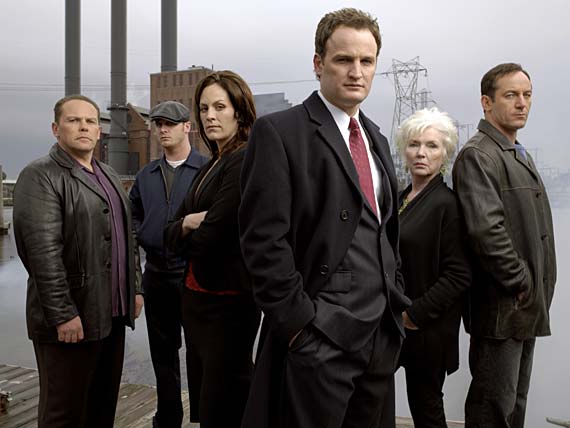Brotherly Love

As an antidote to the politics-free political movie, All the King’s Men, I’d suggest the new season of The Wire, with its major subplot about the Baltimore mayor’s race, or, even better, Showtime’s just-finished first season of Brotherhood. The show treads in what threatens to be overworked territory—the intersection of city politics, mob activity, community life, and family connections—but folds these familiar elements into a tough, knotty tale of conflicting loyalties in the twilight of a Northeastern blue-collar community. Where The Sopranos is, at its amoral heart, a gunpowder black comedy about the emptiness and vulgarity of upper-middle class family life, and The Wire is really about the hell of C-list city bureaucracy, Brotherhood, using similar elements as both those shows, aspires to capture the decay of working class communities, in their families, neighborhoods, businesses (legal and illegal), and politics.
The show follows two brothers—one a family man and rising city councilman, the other a local gangster—as they struggle to rise up their respective ladders and keep their struggling working-class community alive. Along the way, we meet a cast of cops, slimy mob bosses, self-interested local politicians, and scheming family members, all trying to thrive, or at least survive, the day-to-day toil of middle class life in Providence, Rhode Island. As might be expected of a fairly complex show that, so far, stretches over almost 11 hours of screen time, there’s a lot more to talk about than could be covered in a blog post, or even a 1000ish word article. But I’ll make a few observations.
The show makes the best case for economic protectionism I’ve seen in a while. Rose Caffee, the requisite scheming mother (you knew there had to be one) of the two titular brothers, loses her union job at a factory and reigns in her pride to take a low paying, no-benefit job at a Wal-Mart-esque superstore. The union reps tell her there’s nothing they can do to stop job hemorrhaging at her factory; the jobs are simply moving to foreign locales where labor is competitive. Smartly, the show doesn’t set this up as an object lesson in why we need to protect our workers, enact trade barriers, and all the rest of the protectionist playbook. Instead, it’s more about how cheap foreign labor is, no matter what anyone does about it, pulling apart working class communities. The days of organized labor are over, it says, and while that may bring great economic growth overall, there will most certainly be individuals and communities hurt in the process—especially those older workers who cannot easily adapt to the changing economy. It doesn’t for a minute convince me that we should enact legislative stops to any of this, but it does make the cost of such economic evolution a little more real.
I’m also fond of the show’s bleak-but-tough can-do attitude. It’s the same attitude taken by many of the show’s characters, the suggestion being that residents of these crumbling city communities will often have to make difficult choices with no right answer, but that they should simply make those choices, hope for best, and accept the consequences when necessary. even the best—Rep. Tom Caffee, for example—can only bail so much water out of the blue-collar ship; the fact, though, that it will eventually sink shouldn’t keep one from bailing as hard as possible.
Case in point: officer Declan’s drunken last-episode speech into the wedding camera, proclaiming that whatever the newlywed couple does, they should just lie to each other, repeatedly and unabashedly. And as we find out when the bride sobs out that, not only is she pregnant, she’s not sure if her husband’s the father, they’ve already begun. The final episode, in fact, suggests that everything in the town is built on a foundation of lies, and that those lies—terrible as they may be—are a significant part of what holds everything together. The show is not so gleefully cynical as to be glib with its declaration of the necessity of deceit, but it is honest enough to recognize that sometimes the myriad complexities, formalities, traditions and rules of etiquette that bind communities together require that the truth be discarded for the greater good.

0 Comments:
Post a Comment
Subscribe to Post Comments [Atom]
<< Home